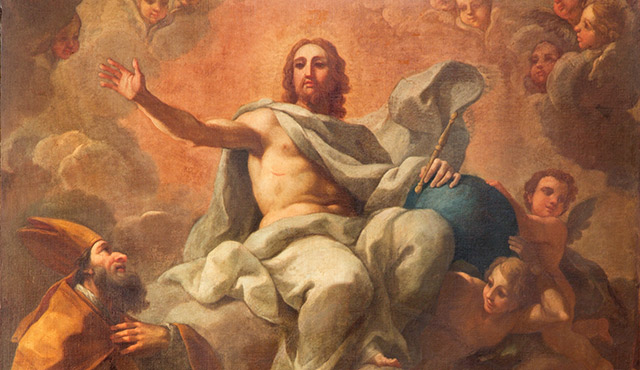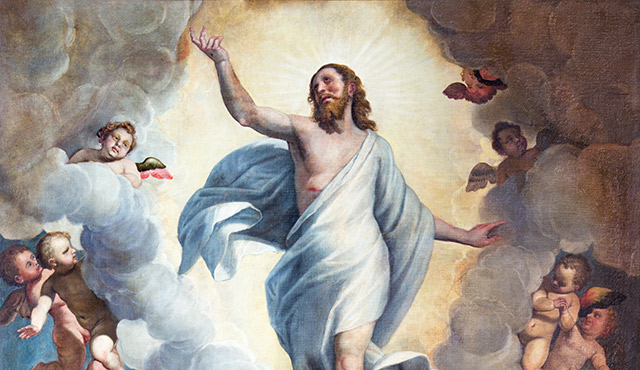Most Catholic scholars understand heaven to be a physical place, but one so beyond the earthly and mundane that it escapes our understanding.
“It’s a real place, sure, but it’s not like we can point to it on a map,” says Pia de Solenni, an associate dean at the satellite campus of the Augustine Institute at Christ Cathedral in Garden Grove. The Augustine Institute is a theology graduate school and provider of faith-formation programs headquartered in Denver, Colo.
And heaven is also a place where Catholics can realize the hope of experiencing a real encounter with God, de Solenni says.
“As C.S. Lewis put it, ‘Christians never say goodbye,’ and that’s because of the hope we all share of going to heaven and being reunited with those we love, as well as fellow Christians, for all eternity,” de Solenni says.
Lisa Miller, writing for Newsweek in 2010 and author of the book “Heaven: Our Enduring Fascination With the Afterlife,” argues that heaven is not a physical place, or even “a process or a supernatural event,” but rather “something that happens in your brain as you die” — a chemical neurological event.
Such a bleak concept, of course, has no place in Catholicism, but there’s debate among Catholic scholars about the nature of heaven — is it an actual physical place, or a state of mind?
Writing in 2015 on Catholic.com, Tim Staples, director of Apologetics and Evangelization at Catholic Answers, posits that heaven is more a state of being than an actual place.
“The Church teaches heaven to be primarily a state rather than a place,” Staples writes. “You can’t travel ‘up there’ to heaven.”
Staples writes about the “beatific vision” of seeing God “face to face” in heaven — a concept, he notes, that is at the heart of “infallible” Church teaching as given by Pope Benedict XII in his Apostolic Constitution, “Benedictus Deus,” of Jan. 29, 1336:
“According to the general disposition of God, the souls of all the saints … and other faithful who died after receiving Christ’s holy Baptism … have been, are and will be in heaven, in the heavenly Kingdom and celestial paradise with Christ, joined to the company of the holy angels. Since the Passion and death of our Lord Jesus Christ, these souls have seen and do see the divine essence with an intuitive vision, and even face to face, without the mediation of any creature.”
The blessed, Staples writes, “will be in a state of comprehension of God that is constant. They can’t leave heaven and then go back to heaven precisely because heaven is principally a state of being.”
De Solenni cites section 326 of the Catechism of the Catholic Church when it comes to the concept of heaven:
“The Scriptural expression ‘heaven and earth’ means all that exists, creation in its entirety. It also indicates the bond, deep within creation, that both unites heaven and earth and distinguishes the one from the other: ‘the earth’ is the world of men, while ‘heaven’ or ‘the heavens’ can designate both the firmament and God’s own ‘place’ – ‘our Father in heaven’ and consequently the ‘heaven’ too which is eschatological glory. Finally, ‘heaven’ refers to the saints and the ‘place’ of the spiritual creatures, the angels, who surround God.”
De Solenni believes that while on Earth we glimpse a sense of its essence in the simplest of pleasures, from an inspiring walk down a gorgeous mountain trail, for instance, to a glass of a favorite wine or a bite of a favorite food, not to mention time spent with loved ones.
“We look at these things and encounters that give us great pleasure and I believe these are mere hints of the extreme peace and joy that awaits us in heaven,” De Solenni says.
Staples, in his 2015 column, cites several Bible passages that allude to heaven, such as I Cor. 2:9 (“Eye has not seen, ear has not heard” of what heaven is like), and I Tim. 6, which discusses how man cannot see God in any sense with his natural powers, but the saints and all of the blessed can be said to have “seen,” Him, and that they do “see” the divine essence with a directly intuited, intellectual vision.
Okay, fine — so what is heaven?
“Heaven is principally a state of utter and absolute fulfillment,” Staples concludes. “In the possession of God in the beatific vision, the blessed will experience what cannot be put into words; a radical union with God that transcends anything we could envisage.”
Whatever heaven really is like, De Solenni suggests considering its opposite — hell — and never being complacent about spending eternity in darkness and misery.
“The devil would love nothing more,” she says, “than to make us believe that hell doesn’t exist.”


